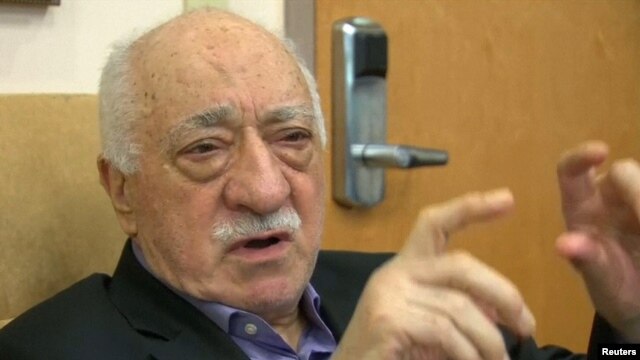Turkey says it has sent 'dossiers' to U.S. for Gulen extradition
| Publisher | Radio Free Europe/Radio Liberty |
| Publication Date | 19 July 2016 |
| Cite as | Radio Free Europe/Radio Liberty, Turkey says it has sent 'dossiers' to U.S. for Gulen extradition, 19 July 2016, available at: https://www.refworld.org/docid/57a43c8f31.html [accessed 5 June 2023] |
| Disclaimer | This is not a UNHCR publication. UNHCR is not responsible for, nor does it necessarily endorse, its content. Any views expressed are solely those of the author or publisher and do not necessarily reflect those of UNHCR, the United Nations or its Member States. |
Last updated (GMT/UTC): 19.07.2016 11:17
By RFE/RL
 Fethullah Gulen speaks to journalists at his home in Saylorsburg, Pennsylvania, on July 16.
Fethullah Gulen speaks to journalists at his home in Saylorsburg, Pennsylvania, on July 16.
Turkey's prime minister says Ankara has sent dossiers to the United States for the extradition of a U.S.-based cleric, Fethullah Gulen, over his alleged links to the July 15 failed coup attempt.
"We have sent four dossiers to the United States for the extradition of the terrorist chief. We will present them with more evidence than they want," Binali Yildirim told parliament on July 19.
Yildirim accused the United States of double standards in its fight against terrorism. Washington has said it will only consider an extradition request if clear evidence is provided.
The Turkish government blames Gulen for orchestrating the attempted military coup, in which more than 200 people were killed.
President Recep Tayyip Erdogan has repeatedly called for the cleric's extradition from the United States. Gulen has condemned the coup and denied involvement.
U.S. Secretary of State John Kerry has said that Washington might consider extradition, but it will require not "allegations" but "evidence" that could prove the cleric's wrongdoing in a U.S. court of law.
The Turkish government previously sought unsuccessfully to extradite Gulen after a corruption scandal shook the country in 2013 and triggered the resignation of three ministers.
Gulen, a reclusive figure who resides in the U.S. state of Pennsylvania where he is receiving medical treatment, once again denied any involvement in the coup attempt on July 18 and expressed confidence the United States will not hand him over to Erdogan.
"I have no concerns, personally," Gulen said in an interview with media outlets at his compound in the town of Saylorsburg, where has lived since 1999 when he went into self-imposed exile there.
The United States "is a country of law," he said. "The rule of law reigns supreme here. I don't believe this government will pay attention to anything that is not legally sound.
"As a side note, I will die one day. Whether I die in my bed or in prison, I don't care," said Gulen, 75.
While he may not be concerned about his own fate, the opposition leader said he was very worried about worsening relations between the United States and Turkey in the wake of the weekend's upheaval.
He recalled that Turkish troops fought alongside their American counterparts during the Korean War and that the two nations have been close allies for the decades since Turkey joined NATO in 1952.
"If it is separated from NATO, Turkey would go into a chaos of problems. It would evaporate itself. It would really finish itself," Gulen said. "The United States could find other options, but I think Turkey needs the United States' partnership more than the U.S. needs Turkish partnership."
Turkey has sacked almost 9,000 officials in its crackdown against suspected plotters of the coup attempt since July 16, in which more than 300 people were killed.
State-run Anadolu Agency reported on July 19 that 257 people working at the office of the prime minister have been dismissed and their identifications seized.
In his interview with CNN, President Recep Tayyip Erdogan bristled at the suggestion that the coup attempt is providing him with a pretext for a crackdown on all opponents, not just those who organized the putsch.
"It's just libel," he said. "If Tayyip Erdogan was an oppressive figure, he wouldn't have gotten 52 percent of the vote at the presidential elections."
Meanwhile, the United Nations' human rights chief has called on Turkish authorities to adhere to the rule of law in their response to the failed coup and expressed concern over suggestions in Turkey to reintroduce the death penalty.
In a statement on July 19, UN High Commissioner for Human Rights Zeid Ra'ad Al Hussein also said that independent observers should visit places of detention in Turkey to check on conditions, and for detainees to have access to lawyers and their families.
Human rights should not be "squandered in the name of security and in the rush to punish those perceived to be responsible," Zeid said.
He pointed out that "reintroduction of the death penalty would be in breach of Turkey's obligations under international human rights law – a big step in the wrong direction."
The statement comes as Turkey's Prime Minister Binali Yildirim vowed Ankara will uphold the rule of law and warned against any "feeling of revenge" in the country in the aftermath of the coup.
"Nobody can have a feeling of revenge. This is unacceptable in a state governed by rule of law," Yildirim said on July 19.
With reporting by Reuters and AFP
Link to original story on RFE/RL website
